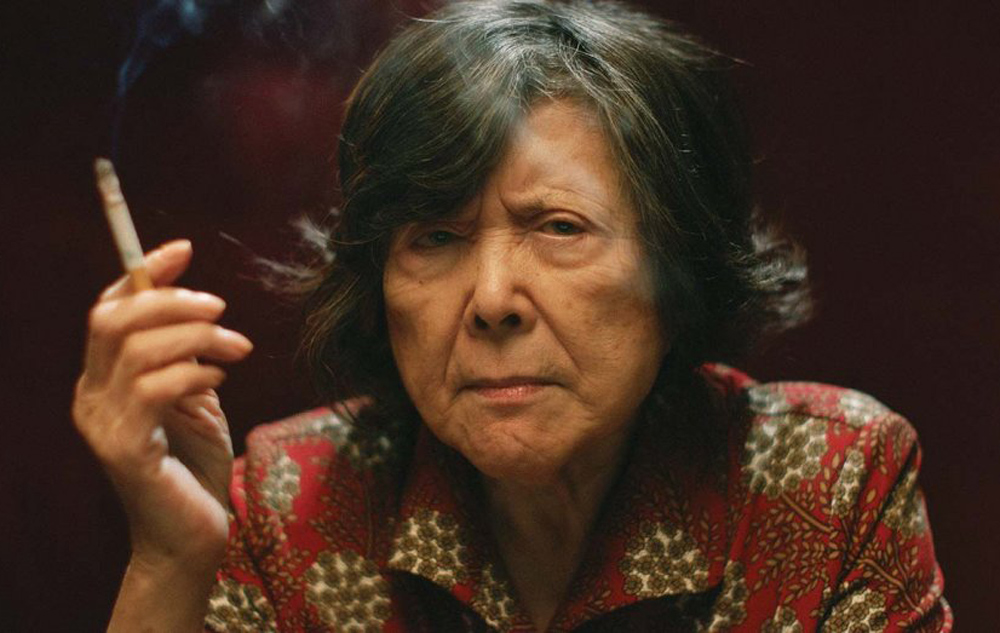Prosperity is promised in the opening minutes of “Lucky Grandma,” when its octogenarian heroine, played by the indomitable Tsai Chin, is told by a fortune teller that there is “‘xin’ in her destiny” following the recent loss of her husband. Her son may be inclined to take her in, but on the expectation of good fortune, she grabs the first bus she can out to the Foxwoods Casino in New Jersey from her home in the heart of New York’s Chinatown, blissfully unaware that while the roulette wheel is unlikely to provide much of a return on the money she’s cashed out of her checking account, the man sitting next to her on the ride back who leaves behind a duffel bag full of crisp $100 bills makes the trip more than worthwhile.
A winner in more ways than one, Sasie Sealy’s relentlessly charming crime comedy owes its success more to skill than luck as Grandma comes to learn that she may have picked up more than she bargained for when the bag belonged to an gangster. However, it was an unlikely twist of fate turned the film into a reality when the script she wrote with Angela Cheng was selected by the Tribeca Film Festival to be the second recipient of the $1 million Untold Stories grant, giving Sealy a budget and a deadline of just one year to turn around her feature debut. Any scurrying around that the filmmakers had to do to set up the ambitious production comes across now as part of its frenetic energy, following the lead of Grandma, who is quick to think on her feet, even if she is a bit slower than she used to be to move on them, as she has to elude the local triad.
Armed with a turn from Chin where one hangs on every word as constantly as the cigarette that dangles from Grandma’s lips at all times, Sealy dazzles with “Lucky Grandma” as action scenes commence with aplomb and zesty one-liners get a head start on the bullets that fly, and while she grew up with a father who introduced her to everything from Akira Kurosawa to “Last Year at Marienbad” and also watched “every bad Hong Kong movie with my mom,” she didn’t know a career in filmmaking was even a possibility until she got serious about photography in college and realized that making movies would be a natural extension. She wasn’t wrong — having studied under Gregory Crewdson, her eye for lighting and composition makes individual frames leap off the screen — and with her first feature under her belt and the film now rolling out online through virtual cinemas, she and her co-writer Cheng spoke about how it felt like they were the ones getting away with something with this delightful caper.
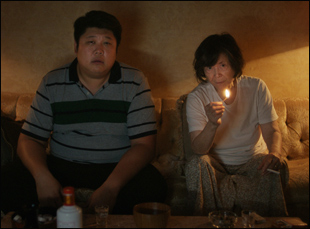
Sasie Sealy: It was really crazy. Because usually movies take a long time to put together and you piece together a little bit of money at a time, so when you get close, you can feel it. This was like overnight, all of a sudden, they just hand you that giant check and you’re like, “Okaaay?” So we had to rearrange our lives. I was directing some other stuff that I had to get out of and my Angela has a day job, so she had to rearrange and my producers were on other projects. Casting took forever. We shot in mid-October and we had to do the casino shoot separately for scheduling reasons, so I didn’t even see a full assembly of the movie until like the first week of February. So it was a mad scramble, especially the end.
What nudges you to submit this to the Untold Stories contest in the first place?
Sasie Sealy: This has had a long genesis. I had this other script that was in development at Focus and it was a very serious sci-fi film I thought was going to get made years ago. When I was developing that, this was the era when Focus closed its New York and London offices and James Schamus left and I was really frustrated, so I think writing this was a reaction to that. I just wanted to write something very pure and not really listen to anybody else or be in development forever. I wanted to write a comedy, just something fun and when I had this idea, I recruited Angela, who I knew from film school. She’s great and hilarious and writing has always been a challenge for me, but then finding the right partner was really kind of magic, especially because we have similar senses of humor. I did sketch comedy in college and I always liked writing in groups, especially [for] things that are funny, and having at least one other person to bounce ideas off of makes it more fun.
Angela Cheng: Actually, the reason why we work so well together is we’re very complimentary. I’m very iterative. We really came up with the general structure and fussed with exactly what we wanted to convey and then we each assigned ourselves scenes and went home and wrote ourselves. And I have a tendency to throw out as many ideas as possible and then hand it over to Sasie to prune and figure out what felt right to her. She would write her piece and I would give it the “Grandma” treatment that we both agreed on. People ask what part is yours and what part is Sasie’s and because it’s filtered through the both of us so much, it’s really hard to parse out. It was truly a collaborative effort.
Sasie Sealy: Yeah, although I will give Angela credit for some of the best one-liners in the movie – the “make large babies” is Angela’s line.
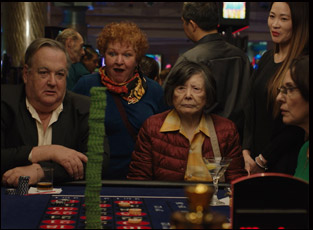
Sasie Sealy: Of course I knew [Tsai] because Auntie Linda was the one that made me cry in “The Joy Luck Club.” [laughs] But I thought at first she was too old for the role because at first, we were looking for someone more in their sixties or seventies and then age them up because the character’s 80. Tsai is actually older than the character, but a friend of mine saw her at a Q & A for a 25th anniversary screening of “Joy Luck Club” [where] she did a classic Tsai Q & A performance, and called me afterwards and [said], “I don’t know, Sase, she still seems pretty feisty to me. Maybe you should meet her.” So she read the script and I flew to L.A. and we had this epic, four-hour dinner where it was like this mutual seduction. She spent the first 30 minutes telling me why I shouldn’t hire her, which were basically that she’s too old — and she likes to fill me in on all of the realities of being old and how I know nothing and this is what it means — but I was pretty much like, “you’re Lucky Grandma, so we’ll deal with it.”
Are there things you can take advantage of with her once you know she’s playing the role?
Sasie Sealy: We didn’t really rewrite anything. Basically when we found her, we were like, “Grandma. Great.” But she’s a Mandarin speaker and not a Cantonese speaker and New York Chinatown is traditionally very Cantonese, so we made up a new backstory for grandma so it made sense historically, and there were just a few adjustments just because of her age, like the chase scene – there were a few adjustments in that in terms of the physicality that would work a little bit better for her. There was a stunt double for some of it, but she still had to do a lot. She obviously doesn’t run – she walks quickly-ish.
Angela Cheng: Yeah, a little bit of realism had to kick in. But the fact that she knows the neighborhood really well and has to take shortcuts instead of run at full speed and actually builds in really well with her character.
Was it a challenge to decide how big to go in terms of the tone?
Sasie Sealy: I never had any doubt about the tone, but it did take a while to totally gel for everybody because a lot of Asian movies have a lot of different tones. I’m very into Bong Joon-ho and a lot of the Korean movies…
Angela Cheng: Yeah, because of the movie references we kept on trading back and forth, we were very clear on it. So much New Wave Asian Cinema feels like it does that tone-crossing thing that’s not always very American, but it’s something that really appealed to both of us, so “Mother” or even “The Host,” which is a big, broad monster movie, but had its very weird Asian moments was some of our inspiration for how you take a somewhat dark subject that could be melancholy but make sure that it’s funny and entertaining.
Sasie Sealy: We were also really into Sebastian Silva’s “The Maid.” I love that movie, just for character and the sense of humor.
Angela Cheng: It’s so funny and uncomfortable in a way that I think we were both really inspired by it. So it was really just a sensibility going in and we were never thinking how do we shift from this [tone] to this [other tone] because it just felt like part of the story.
Sasie Sealy: You’re just following Grandma, and as long as you’re anchored in Grandma, it’s okay. And the music helped a lot. Black comedy is always a little tricky tonally and I looked everywhere even to find temp score, but really the only things I could find that I loved was the “Seven Samurai” score with all that big brass, which I knew we wanted because we wanted something ballsy. I have this wonderful composer Andrew Orkin, who also did “Dead Pigs,” and we were listening to all these ‘60s Nancy Sinatra and other kind of covers done in Chinese that were really big in Singapore and Hong Kong during the ‘60s.
We took inspiration from that — the big brass the first thing, and then there’s this cue “Tabla” that Jon Brion did for “Punch Drunk Love,” which is very unusual, very percussive, and I knew that I wanted a lot of percussion too. We didn’t really want an Asian score, but we used a lot of big Asian drums to have this retro sound from the time when Grandma would’ve been young, we also had electronic elements because we liked weird sounds. I’m very into sound design and wanted that to be part of the music, so there’s those scenes where she’s going back to talk to Lao Shai [played by Zilong Lee], where Andrew put in all these different sounds and I had this amazing sound designer Eugene Gearty, Ang Lee’s sound designer, who had done a bunch of work to weave those together. Andrew and I called it a “big, little movie,” so we wanted to have a big, little score.
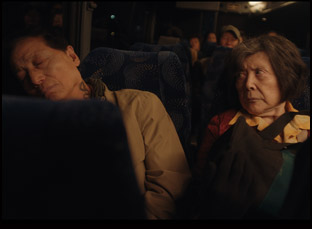
Sasie Sealy: No, it’s always been the challenge. I write bigger than I can afford, especially a movie like this. Really, this should be a $3 to $5 million movie, but even now in this climate, I think it’s challenging to raise that kind of money for a movie with an old Asian lead and all in Chinese, so it was always a big, little movie on the page and we just were like, “Well, we’re just going to go for it. We just wanted to make something original. We didn’t want to make a normal indie movie.
Having a casino in the movie certainly gives it that bigger feel. How did you swing that?
Sasie Sealy: Basically, we were looking and we had run into some challenges getting permission for New York state casinos, so we were looking in Connecticut [which were] the original ones we scouted when we were researching the script because all those buses go to Connecticut. Eventually, we were put into contact with Foxwoods. There was a brief period where we also thought we were filming in Snoop Dogg’s place…
Angela Cheng: Yeah, Snoop Dogg apparently runs a casino, but…
Sasie Sealy: It’s more like his own personal hangout…
That sounds about right.
Angela Cheng: Yeah, it’s more like his house. They showed us photos and I’m like, “This is just like a house.” [laughs]
Sasie Sealy: But Foxwoods was amazing. We worked out a deal where in exchange for [the use of the place] we have their name in the movie [which] of course was great because all the chips are real. All the dealers are real dealers because you can’t put actors behind the tables. It has to be an actual licensed dealer. There’s a lot of rules about filming in casinos, which we didn’t know. [laughs]
It looked like you had a field day shooting B-roll for the jazzy montage sequences.
Sasie Sealy: Well, the casino was fun. That was our first team, and it was all storyboarded. We needed all those. And the B-roll day in Chinatown was super fun. Our co-producer Joanna [Lu] is like the queen of Chinatown. She basically works on every movie [shot there] — she was working on “Joker” and our tiny movie at the same time. [laughs] But she’s an amazing badass and she went out with me and helped us arrange permission to shoot all the B-roll and it’s just me and the camera and an AC. But Chinatown’s pretty cinematic. It’s fun to shoot.
Angela Cheng: Yeah, it’s built in, gorgeous stuff.
Sasie Sealy: And we did that a little bit later, so I knew what we needed for the shopping sequence. We call that [Grandma’s] Julia Roberts moment.
Angela Cheng: Totally. Her transformation. It’s like the promise of the premise – when you win that money, you get to go on a shopping spree.
Sasie Sealy: And get some dried shrimp.
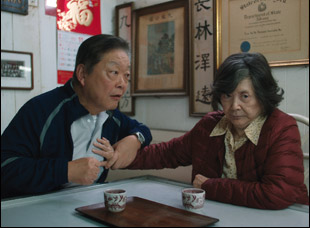
Angela Cheng: It was a lot of fun. I don’t know why I was surprised, but [when we had] an open casting call to the Chinese community in midtown Manhattan, over a hundred people showed up very eager, and we spent all day just talking to people, taking photos and asking questions…
Sasie Sealy: The bank singers came from that section because we were like, “Oh can you sing?” And the Tai Chi ladies came from that – like “Who can swim?” All of the bus people [you see bound for the casino]…
Angela Cheng: They really came out in full force and were very excited for the project. Almost all of our background actors, except for a few, came from that one initial casting.
Sasie Sealy: And [Joanna], our co-producer, helped us organize that. There’s a community center at 49 Mott [where] we were able to do the casting in the neighborhood, and it’s just really cool. It’s such a community there.
Was there something that was unexpected that happened that you now really like about the film?
Angela Cheng: That rainy day.
Sasie Sealy: Oh, the dumpster scene where they dump the body in the alley. That was actually miserable when we were shooting it. [laughs] That back alley behind a mahjong parlor where the dumpster was was so small that we couldn’t actually get a real dumpster back there, so our art department constructed that dumpster in pieces and brought it in and assembled it. There was a dead animal back there. [laughs] But it looks very cinematic on screen, so the rain was good.
Angela Cheng: And [for another scene] Betsy, the bus lady, was [great]. We always wanted [that character] to be funny and randomly throw out a lot of rules, and I think the gossip line and the “don’t spit” line was in there…
Sasie Sealy: But she added the “patooey.” Kristen [Hung, the actress that played Betsy] surpassed all of our dreams and ad-libbed a little bit.
Angela Cheng: She just added all the color to it.
Sasie Sealy: Another happy accident on the bus was the scene where the bag falls, which is a key scene. We were always worried about how we were going to light that and we were really driving along backroads along the casino on the reservation, so that’s where that was filmed. Originally, we had a whole plan to just drive around in a parking lot and put curtains on the windows so you couldn’t see that…
Angela Cheng: Right, and a television screen to cast light…
Sasie Sealy: But then in the end, what we ended up doing is just literally driving along those backroads and there were enough [ambient] lights there that we were able to use that.
My second time seeing this, I realized how difficult it must’ve been to shoot inside the bus and remarkably, there’s this long pull-out shot you see of Grandma. How did you even have the room?
Sasie Sealy: It’s a zoom. Originally I wanted to move through the bus and show everybody else sleeping and then land on Grandma, and I wanted to do a camera move, but it’s physically impossible on the bus, so Eduardo [Enrique Mayén, the cinematographer] and I had been looking at some ‘70s things [for reference]. There’s a couple zooms in the movie, so a super slow zoom became my solution for not being able to do an actual camera move.
Angela Cheng: Yeah, somebody [said to me], “How did you do that floating shot in the bus?” I’m like what are you talking about? It was always on a tripod. One of my favorite sequences, but it was really tough.
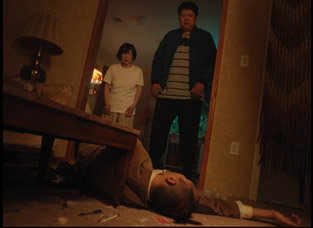
Sasie Sealy: It’s fun to show our friends what we’ve been doing because we haven’t been able to hang out for the last year, so we’re like, “We’re sorry we’ve been bad friends. This is what we’ve been doing.”
Angela Cheng: And it’s been really gratifying too. People have been incredibly supportive of the film, which is always a relief, but also just very lovely to hear random text messages and Instagram posts talking about how much they love the movie.
Sasie Sealy: And when people we don’t really know or who aren’t Chinese or aren’t Asian at all come up and say it reminds them of their grandmother, that’s also nice. You make movies to touch people.
Angela Cheng: So many people have been so encouraging of the fact that this is amazing to see a film led by an 80-year-old Chinese woman, and [while] we definitely wanted to make a film about an 80-year-old elderly Chinese woman, it was never in service of trying to put an 80-year-old Chinese woman [on screen], so there’s something about that that feels really gratifying and lovely.
“Lucky Grandma” opens on May 22nd in virtual cinemas, splitting proceeds with your favorite local arthouse. A full list of theaters is here.




